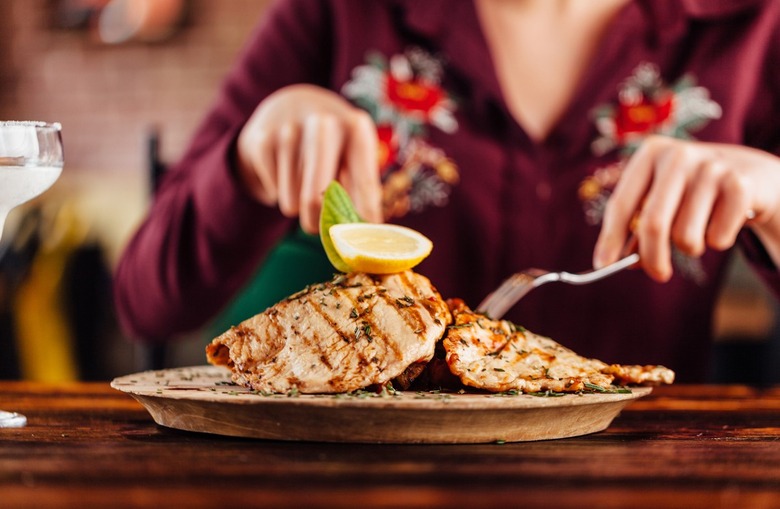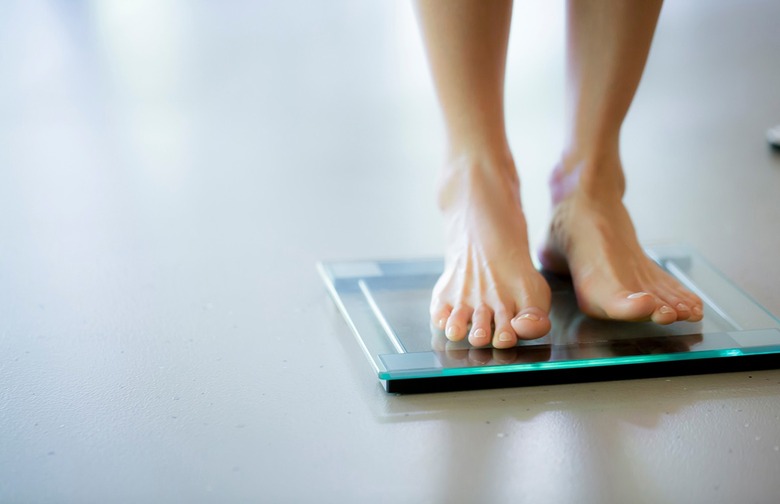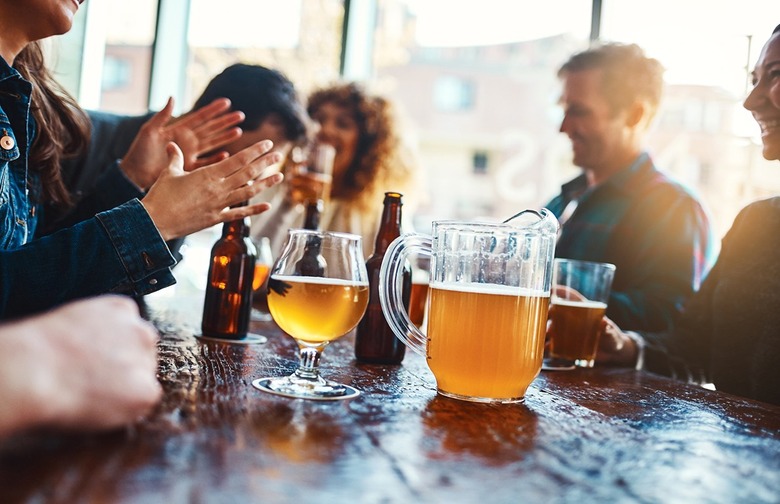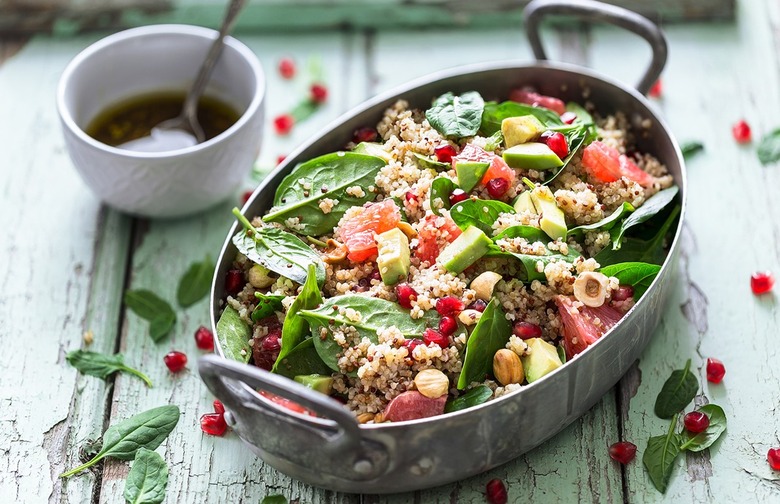This Is What Happens To Your Body When You Quit Carbs Gallery
Carbohydrates seem to be on so many people's food blacklists lately. Who hasn't heard a story from a friend or co-worker who credits a low-to-no-carb diet as the catalyst for dropping those hard-to-lose pounds, clearing up persistent acne, or revitalizing lagging energy?
But health professionals are cautioning people to not be so quick to ditch the carbs. "With the frenzy of low-carb diets such as paleo and ketogenic diets being all the rage, it's no wonder everyone is getting the message to cut back on carbs, but to avoid them completely is a very bad mistake," Cheryl Mussatto, MS, RD, LD, tells The Daily Meal.
"Not all carbohydrates are created equal," adds Dana Harrison, MS, nutritionist, and educator at Eats 2 Know, LLC. Just like other macronutrients, carbohydrates vary greatly in their nutrient profile. Refined carbohydrates tend to be nutrient-poor but calorically dense. Yet many carb-heavy foods are full of the good things your body needs.
Complex carbohydrates like those found in vegetables (yes, vegetables have carbs!), whole grains, and legumes come packaged alongside nutrients, fiber, and satiating protein, and a well-balanced diet is the best way to achieve optimal nutrition. And completely cutting out any food type can cause problems. "Elimination of a food group that you enjoy, i.e. carbs, can only lead to feelings of deprivation, causing you perhaps to overeat and surrender to an unhealthy style of eating," explains Keri Gans, MS, RDN, CDN and author of "The Small Change Diet."
Unless your doctor has recommended a specific eating plan for medical reasons, there's no need to give up an entire food group, but that doesn't seem to stop some people from going to dieting extremes. If you do choose to drastically (or entirely) cut carbs out of your diet, read on to find out some of the things that might happen to your body.
You Could Lose Weight
Many foods with refined carbohydrates tend to be calorie-dense but nutrient-poor (think baked goods, instant rice, chips, and sugary snacks). By cutting these types of higher-calorie foods out of your diet, you could lose weight, simply by taking in less calories overall. Chelsey Amer, MS, RDN, CDN, and founder of Chelsey Amer Nutrition, tells The Daily Meal, "It's true that you may lose weight when you quit carbs, but you're often losing a lot of important nutrients as well. Plus, initially, it's mostly water weight!" Eliminating an entire food group might result in initial weight loss, but it's not a healthy, sustainable option for most people.
You Could Gain Weight
According to Keri Gans, by cutting carbs you might gain weight "by overcompensating with high-protein and high-fat foods or by feeling deprived and eventually overeating." High-protein and high-fat foods tend to be very calorie-dense, so you may actually gain weight if you end up eating larger quantities of these foods, such as red meat, eggs, and avocados. It's wise to discuss any drastic dietary changes with your doctor to ensure you're getting all the nutrients you need.
Energy Levels Drop
"Carbohydrates, also known as sugars and starches, have many functions, including being our body and brain's main source of energy, keeping us alert and energized," says Cheryl Mussatto. Carbs break down to provide glucose, the building block our bodies need for so many of their essential functions. Without carbs, many people experience a lack energy and often feel a general malaise or flu-like symptoms. Courtney Ferreira, a registered dietitian and personal trainer in Baltimore, adds "if you are deciding to drastically cut back on your carb intake it can take time for your body to adjust to your new way of eating. Don't forget to up your fat intake considerably should you go this route."
Constipation
Fiber is crucial in the diet for regular, healthy digestion. Carbohydrates such as whole grains, fruits, and vegetables are packed with fiber, so cutting them out of your diet may cause you to be a bit backed up. Fat and protein take longer to digest, so diets that rely solely on those nutrients tend to result in constipation. According to Ariane Resnick, CNC, "The less fiber you eat, the harder it is for your body to have proper motility. Keto diets tend to eschew even resistant carbs like fiber, which makes constipation a regular (pun intended!) problem."
Bad Breath
Ketosis is the aim of the ketogenic diet, a popular diet that restricts carbohydrates to extremely low levels. Cheryl Mussatto explains that "Ketosis is the process in which the body converts fats into ketones, which are a byproduct of the body breaking down fat for energy. Being in ketosis is what helps a person burn fat and lose weight. Ketosis does have a side effect of possibly causing bad breath due to the ketones being broken down as a fuel source, with acetone being one of the byproducts excreted from the body in the urine and breath." And keto dieters can't reach for a Tic-Tac to save the day — they contain carbs!
Sugar Cravings and Preoccupation
If you're used to consuming refined carbohydrates on a regular basis and you abruptly stop, you might face more than just a serious case of the hangries. You might find yourself dreaming about sugary, carb-y foods constantly. Chelsey Amer warns that "Restricting any major nutrient (like carbs) can lead to a pre-occupation with food and excessively strong cravings, setting yourself up for a major binge in the future."
Possible Lowered Risk of Diabetes
Carbohydrates are macronutrients that turn into sugar (glucose) when they are broken down. Refined carbs break down faster than complex carbs like those in sweet potatoes, which contain fiber to slow the process. How quickly that glucose enters your blood stream can cause blood sugar levels to fluctuate. According to the Mayo Clinic, prediabetes happens "your blood sugar level is higher than normal but not yet high enough to be Type 2 diabetes, and without lifestyle changes, people with prediabetes are very likely to progress to Type 2 diabetes." Ariane Resnick adds, "If you eat a high sugar diet and are pre-diabetic, then you eliminate sugar, then yes, your chances of developing diabetes will be reduced."
Headaches and Brain Fog
Cheryl Mussatto notes that the brain loves glucose. "If carbs are strictly reduced, the brain will be cut off from its main energy source, which can drastically alter brain functioning. One such change can occur with serotonin, a chemical produced by the brain. Serotonin regulates our sleep cycle, mood, and appetite, all of which will be noticeably altered along with experiencing brain fog."
Lowered Alcohol Tolerance
While in ketosis, the liver is focused on making glucose and ketones. Thus, its ability to process alcohol becomes impaired. To counteract this, be sure to drink plenty of water and eat foods rich in fat to slow down the rate at which your body metabolizes the alcohol.
Final Thoughts
All the nutritionists we spoke with emphasized the importance of focusing on the quality and types of carbohydrates a person consumes, rather than cutting them entirely (unless directed by a doctor). Cheryl Mussatto summarizes: "We need carbohydrates, and we need carbs the way nature makes them naturally — fruits, vegetables, whole grains, nuts, seeds, legumes, and dairy such as milk and yogurt. When you consume the majority of your carbs in this form and limit intake of sugary sweets such as soda, candy, cookies, and other desserts, you'll be feeding your body exactly the type of carbohydrates it needs best." Your body is unique, adaptive, and always changing, and feeding it properly can help you to appreciate all of the amazing things it does every day.
More From The Daily Meal:
How Much Water Is Too Much? We Asked 15 Nutritionists
20 Incredible Ways Happiness Affects Your Body
Nutritionists Confess Health Rules They Always Break










